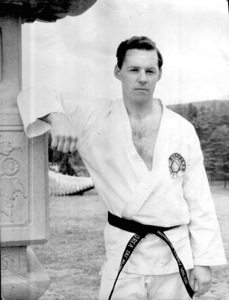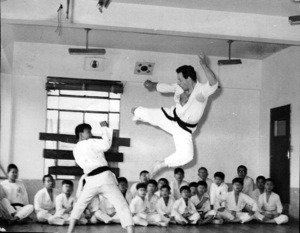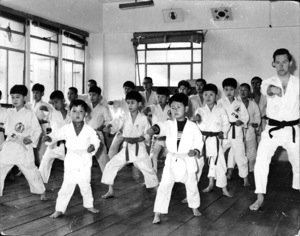


In 1968, during the second term of his Korean scholarship, Grandmaster Walsh was invited by the (then) All Korea Middleweight Champion, Master Park, to attended Park’s private winter mountain training. Park trained in the snow to prepare his mind and body for competition. The temperature in the Korean mountains during winter consistently falls below -20 degrees Celsius – a result of the chill factor brought by winds rushing through Korea from Siberia. Grandmaster Walsh recalls that water froze in taps and thin icy sheets formed on the floors of the do-jang (training hall) from the condensation of student’s breath.
Grandmaster Walsh was one of only three students to survive the gruelling winter training program. He did not miss any of Park’s sessions during the 30 day camp. 59 other Korean black belts invited by Park failed to complete the program. When Park and his three companions returned to Seoul, Park awarded Grandmaster Walsh a special “Ironman Training” award for (literally) surviving his snow training program.

Later that year, Grandmaster Walsh returned to Sydney to teach Tae Kwon Do and thereby introduced Tae Kwon Do into New South Wales. From his original school in Balmain, he introduced the superior fighting method of the Korean martial arts to many now-prominent masters of Japanese Karate and Chinese Kung Fu.
In 1970, Grandmaster Walsh accepted a third scholarship to further his studies in Korea. In 1971, Master Walsh became the first Australian to receive 2nd Dan Black Belt in Korea from the Korea Tae Kwon Do Association and the Tae Kwon Do Jidokwan.

In 1973 Grandmaster Walsh was invited to attend a national conference held in Melbourne with other pioneer instructors from all over Australasia to organise the first national Australian Tae Kwon Do tournament. Grandmaster Walsh was appointed as coach of the New South Wales team for the inaugural Australian Championships.
After completing his third term of his Tae Kwon Do scholarship, Grandmaster Walsh gave countless demonstrations of Tae Kwon Do and appeared in numerous martial art magazines of the time to foster the development of Korean martial arts in Australia. Over the next decade, Grandmaster Walsh (then graded 5th Dan Black Belt and one of the highest ranking non-Korean Tae Kwon Do Masters in the world) taught Tae Kwon Do to thousands of students, and produced many fine instructors. Throughout this period, he also taught modified Hapkido courses to personnel of the NSW and Federal Police Forces as well as members of the Australian armed forces.
Photo captions:
-
1.1969: Grandmaster Walsh after snow training in the "Secret Garden" of the Changdeokgung (Palace) in Seoul. In ancient times, the garden was only frequented by the King and his favoured subjects. Later, the garden was used for martial arts tournaments and special training sessions conducted by famous masters.
-
2.1969: Grandmaster Walsh demonstrates his jump reverse turning kick at the Kunil Tae Kwon Do Institute in Korea. The wooden planks nailed across the windows were designed to stop students being kicked through them and out into the street.
-
3.1969: Grandmaster Walsh was the first Australian permitted to teach Tae Kwon Do in Korea. He was also one of the first instructors to teach the modified syllabus of the Korea Tae Kwon Do Association which enabled children to learn Tae Kwon Do.
Page 2 of 3
Walsh Martial Arts Australia
P.O. Box 299, Ettalong Beach NSW 2257, Australia
Phone: 02 4369 5210 (Int. +61 2 4369 5210) Mobile: 0432 987 368 (Int. +61 432 987 368) Email: gmwalsh@netspace.net.au
Home | About us | News | Resources | Grandmaster | Instructors | Locations | How to begin | Terms of use